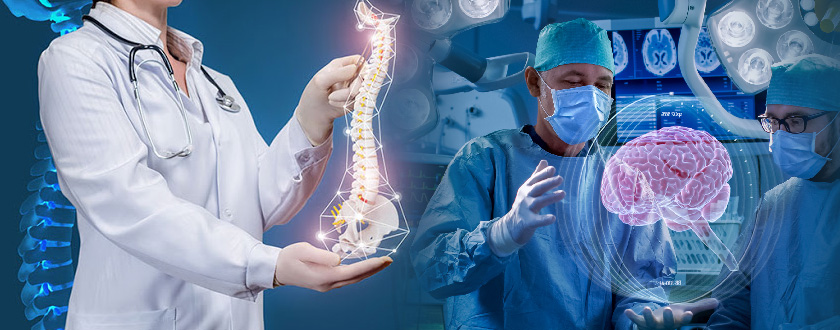Neuro & Spine Surgery
- General Medicine & Internal Medicine
- General Surgery
- Critical Care & Emergency Medicine
- Orthopedics & Arthroscopic Surgery
- Joint Replacement surgery
- Obstetrics & Gynecology
- Pediatric Medicine & Pediatric Critical Care
- Pediatric Surgery
- Cardiology
- Endocrinology & Diabetology
- Nephrology
- Urology & Genitourinary Surgery
- Medical Gastroenterology
- Surgical Gastroenterology
- Neurology
- Neuro & Spine Surgery
- ENT
- Laparoscopic General Surgery
- Poly Trauma
- Opthamology
- Medical Oncology
- Surgical Oncology
- Plastic & Corrective Surgery
- Hepatology
- Dermatology
- Rheumatology
- Vascular Surgery
- Dental & Facio Maxillo Surgery
- Psychiatry & Family counseling
- Radiology
- Homeopathy
- Advanced Physiotherapy

NEURO-SPINE SURGERY
Neuro-spinal specialists can perform many types of surgeries to alleviate uncomfortable symptoms, correct misalignment, and repair spinal structures. Spine surgery may correct unhealthy abnormalities in the spinal cord, nerves, ligaments, vertebrae, and the discs between them. It can be performed in the cervical, thoracic, lumbar, and sacral portions of the spine and surrounding tissues.
During conventional spine surgery, doctors use thin blades and manual instruments to open the skin and modify the tissue and bone beneath it. Recently introduced neuro spine surgical procedures implement endoscopic techniques, using tiny, camera-controlled tools to perform minimally invasive procedures. Doctors at our hospital also use laser tools to adjust the spine, although these methods are relatively new in the field and are still being developed.
Some of the most commonly performed spine surgeries for spinal cord injury include:
Discectomy:
The discs between vertebrae can become herniated; meaning that part of their centre protrudes through their tough exterior, or is otherwise damaged. This can occur anywhere along the spine, causing pain and weakness. Herniated discs can also lead to other spinal disorders. During a discectomy, a neurosurgeon excises a portion or the entirety of the damaged disc to alleviate these symptoms. Discectomy can be a standalone procedure, or it may be performed in conjunction with spinal fusion, laminectomy, or other surgeries.
Disc Replacement: This procedure is the same as discectomy, except that the neurosurgeon inserts a prosthetic spinal disc after removing the natural tissue. Some patients tolerate disc replacement more easily than spinal fusion.
Spinal fusion: Patients with scoliosis, kyphosis, fractures, herniated discs, or other spinal disorders may benefit from spinal fusion surgery. This technique usually involves removing the natural disc between vertebrae and then placing a bone graft between the affected vertebrae to adjoin them. Doctors may also use surgical instruments such as plates, wires, cables, or screws to create the framework for spinal fusion. After this surgery, the bones gradually integrate for six to nine months, completing the process. This surgery can stabilize the spine and reduce related nerve issues. Spinal fusion sometimes requires revisional surgery to fully correct.
Laminectomy: Spinal stenosis, disc herniation, and other issues can cause nerve compression and shrink the spaces between spinal structures. To correct this condition, neurosurgeons can perform a laminectomy, during which they remove a segment of the lamina, the top portion of the bone that encloses the spinal cord. This can alleviate pressure on nerves and tissues.
Interlaminar implant: As part of a laminectomy, a neurosurgeon can also place an interlaminar implant, U-shaped prostheses that decompress the spine and provides more space for nerves and spinal cord tissue.
Foraminotomy: The foramen is a hollow bone that protects the nerve roots along the spinal column. If this bone becomes damaged or too narrow, it can interfere with nerve function. In this instance, neurosurgeons can perform foraminotomy surgery, a procedure to adjust soft tissues and bones in the foramen. If neurosurgeons significantly alter the foramen or remove a large portion of it, they may terminate this surgery with a foraminectomy instead.
Kyphoplasty: Using this modern surgical strategy, neurosurgeons use x-ray imaging to map the spine, and then use a needle and balloon to enlarge the space between malfunctioning vertebrae. Once there is adequate room for it, they inject special bone cement into the area to support the spine.
Osteotomy: In cases of severe spinal misalignment or deformity, neurosurgeons may recommend osteotomy. During this procedure, they strategically fracture or break vertebrae or other spinal bones to improve posture and correct structural abnormalities. Ideally, the affected bones will adapt and heal in a way that benefits the spine.
Our speciality Operation Theatres with the expertise of our neuro spine surgeons ensure a fast recovery process along with the precision of surgical procedures.
